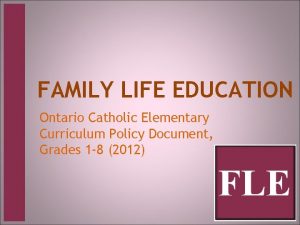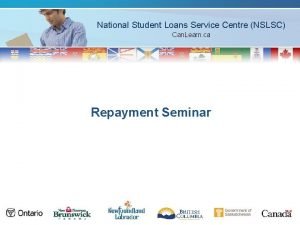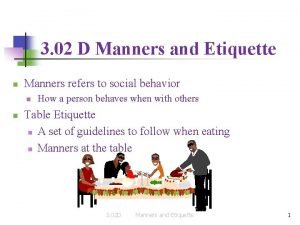Manners Lesson Honesty Intended Student Outcomes Ontario Curriculum









- Slides: 9

Manners Lesson – Honesty Intended Student Outcomes - Ontario Curriculum Expectations Language Arts Grade 3 – Oral Communication Listening to Understand Grade 3 – Oral Communication Speaking to Communicate

Grade 3 – Reading for Meaning Grade 3 – Writing Developing and organizing content

Rationale Students will be able to infer ideas about honesty from the story of Yusuf (AS) and use them to relate them to their own lives using various methods. Introduction: Begin the lesson by creating a T-chart - write the word Honest on one side and Dishonest on the other. Brainstorm the best words to describe both Compare the words. Truth vs. lie Friend vs enemy Fair vs unfair Tell the students you will add more words later on in the lesson. Inform students that the Story of Yusuf (AS) is the only chapter in the Quran that tells the story of a Prophet from beginning to end. Tell the students that you will be reading the story so you all can learn more about honesty and its importance. Read the story to the students. Have them note down when they hear things about honesty or lies. Try and note down at least 3 things.

Lesson Procedure: 1. Create a T-chart with Honest and Dishonest as the headings. Encourage students to think of opposites. 2. Read the story of Yusuf (AS) from the Quran or from the story provided below. 3. After reading the story, continue adding words to the T-chart that would describe Yusuf’s characteristics and his brothers. How are they different? Have the students do a think-pair-share. The teacher will then ask the students to give some words and ideas they came up with. 4. Divide the class into groups. Each group will discuss good characteristics that Joseph had versus negative characteristics that his brothers had, based on the words given during the think-pair-share. Here is an example of how the groups should be divided (although the content of what they discuss may differ depending on the words they came up with during the think-pair-share): Group A - Honesty versus dishonesty Group B - Patience versus jealousy Group S- Love verses hate Group D - Kindness versus violence Students should discuss the following questions: How did the good characteristics benefit Joseph? How did the negative characteristics hurt his brothers? When do you see/have you seen these characteristics in your lives? For example, where/when have you seen a person being honest? Where/when have you seen jealousy? 5. The students will then be reorganized into new groups. One student from the previous group will be put into a new group. Example, one student from group A will be put into group 1. Another student from group A will be put into group 2. Another student from group A will be put into group 3, until all the students have been placed in new groups. Do the same with group B. Put one student into group 1 another into group 2 until all the students have been moved. Do this again with group C and group D.

6. Each student will then present the information that they discussed in their old groups. The students will all have to note down the characteristic and what the students say about it. This is a way for the students to listen attentively and allows the teacher to assess the activity. 7. The next activity is to create two kinds of skits to contrast the good and bad characteristics. Have some of the groups act out a skit in which they pretend all the teachers, administrators and the Principal and Vice Principal only have the bad characteristics from the story, and have other groups act out a skit in which everyone has only good characteristics. This will give students a visual representation. Ask and instruct students: “What would your life be like? Create a skit with your group showing what a day at school would be like. ” Some ideas to use in their skits can include: • A classroom setting • An assembly with their principal • Recess • Parent/teacher interviews There should be a script and each person in the group must have a role. 8. Present the skits to the class.

A brief story of Prophet Yusuf (A. S) Allah has given us the beautiful story of Prophet Yusuf (as) in the Quran. In it Allah teaches many things including how to be honest and patient. When Yusuf (as) was born, his father, Prophet Ya’qoob (as), was overwhelmed with thankfulness towards Allah. He loved Yusuf (as) very much and treated him with love and affection. Yusuf (as) had ten older brothers and one younger brother. His older brothers didn’t like that their father was so loving towards Yusuf (as) and they started to become jealous. As Yusuf grew older, he became more and more beautiful. But it was not only his face that was so attractive, Yusuf (as) was also very intelligent, kind, patient, and honest. He was admired by not only his father but by many others in his town. One night Yusuf (as) had a dream and Allah revealed to him that he would be a great Prophet. Yusuf’s family were shepherds and his older brothers would take the sheep out to feed far away from their home. One day, his brothers decided that they hated the way their father treated Yusuf and they decided to kill him. But one of Yusuf’s brother told them, that they shouldn’t kill Yusuf but throw him in a well. Yusuf’s brothers asked their father if they could take Yusuf with them so he could learn how to graze sheep. Prophet Ya’qoob (as) was worried about Yusuf and said “Maybe you will forget about him and a wolf might eat him. ”

The brothers assured their father that Yusuf would be protected by them. Prophet Ya’qoob (as) reluctantly agreed and Yusuf left with his brothers in the morning. When they were far enough away, his brothers betrayed him. They beat him and threw him in a well. They left him there until a caravan came by. The men from the caravan pulled Yusuf (as) out of the well. The brothers said that he was their slave and they sold him to the caravan for a very little money. When the brothers were going home they decided to tell their father that Yusuf was eaten by a wolf. They had taken a shirt from Yusuf before he left with the caravan and they covered the shirt in blood. They pretended to be sad and went back home crying to their father. Prophet Ya’qoob (as) asked them what happened and they told him that Yusuf had be eaten by a wolf. Their father knew they were lying, but he still didn’t know where Yusuf was so he began to cry. Prophet Ya’qoob (as) cried for 30 years from that day because his brothers never told their father the truth. Yusuf (as) was taken to Egypt and made the slave of a wealthy man in Egypt. He became well known for his honesty and wisdom. After 30 years, Yusuf’s brothers came to Egypt looking for food because of a terrible famine. Yusuf (as) was in charge of giving out the food so people wouldn’t starve. Yusuf recognized his but they didn’t recognize him because he was now a grown man with a full beard. He missed his brothers dearly and still loved them, but wanted to help them become more virtuous. He told his brothers that they should bring back their younger brother Benjamin and only then he would give them more food.

When the brothers asked their father Prophet Ya’qoob (as) to take Benjamin with them, he refused, remembering when Yusuf had gone with them, and never returned. The brothers begged their father and he let Benjamin go. Yusuf (as) had a plan to keep Benjamin with him so as to teach his brothers a lesson. Yusuf (as) made his brothers believe that Benjamin had stolen something from him. According to their traditions Benjamin would have to stay with Yusuf to work off his crime. Benjamin was also a very honest person and the brothers did not believe that Benjamin had stolen anything, but they could not argue with Yusuf’s guards. When they returned back from Egypt without Benjamin, Prophet Ya’qoob (as) cried even more remembering how Yusuf was taken and never returned. The brothers and Prophet Ya’qoob went back to Egypt to try and get Benjamin back. Prophet Yusuf (as) then told them who he was. Prophet Yusuf (as) had become a great man in Egypt and was also given prophethood by Allah. The brothers finally had to tell their father the truth. Yusuf’s honesty made him into a great man. His brothers’ lies made Prophet Ya’qoob (as) cry for 30 years and they had lost his trust.

Quran and Hadiths O you who believe! Be afraid of Allah, and be with those who are true ( in words and deeds) 9: 119 And mix no truth with falsehood, nor conceal the truth while you know (the truth)2: 42 (They are) those who are patient ones, those who are true (in faith, words, and deeds), and obedient with sincere devotion in worship to Allah. Those who spend and those who pray and beg Allah’s Pardon in the last hours of the night. 3: 17 And whoever honours the sacred things of Allah, then that is better for him with his Lord. The cattle are lawful to you, except those mentioned to you. So shun the abomination of idol, and shun lying speech 22: 30 Rasullallah SAW said: Honesty certainly leads to goodness, and goodness leads to paradise. Truly, a man keeps speaking the truth until he is inscribed as being true through and through. And lying leads to going wrong, and wrong leads to hell. Truly, a man lies and lies until he is inscribed as being a liar through and through. (Sahih Muslim) “Remember, there is no faith in him who is not trustworthy; there is no place for him in religion who cares not for his pledged word or promise. ” “O People! Try to be honest for Allah is the helper of honest people. Avoid telling lies since it will ruin your faith. Know that honest people are on the verge of nobility and honor, while liars are on the verge of collapse and destruction. ” - Ali (RA)

















